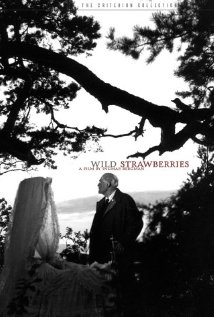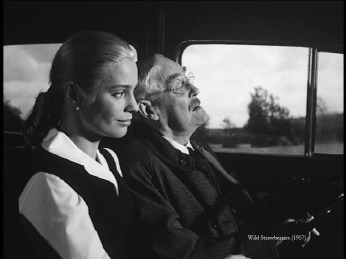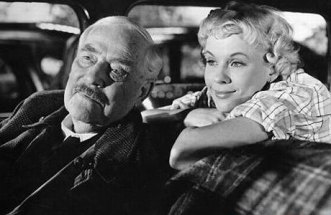Wild Strawberries (Day 8)
 My Opinion: 6.4 || There’s much to admire, but I don’t think it holds the same fascinating power as Persona (my one other Bergman). As a frequently dreamy meditation on memory and age, it brings to mind Andrei Tarkovsky’s Mirror but lacks that film’s lyricism and sublime disorientation. It’s a frequently touching movie but doesn’t achieve profundity as often as I wanted it to.
My Opinion: 6.4 || There’s much to admire, but I don’t think it holds the same fascinating power as Persona (my one other Bergman). As a frequently dreamy meditation on memory and age, it brings to mind Andrei Tarkovsky’s Mirror but lacks that film’s lyricism and sublime disorientation. It’s a frequently touching movie but doesn’t achieve profundity as often as I wanted it to.
TITLE: Wild Strawberries (Smultronstället)
DIRECTOR: Ingmar Bergman
LANGUAGE: Swedish | COUNTRY: Sweden
YEAR: 1957
PROFILE: Drama | 91 minutes | IMDb (8.3)
SYNOPSIS (courtesy of IMDb): After living a life marked by coldness, an aging professor is forced to confront the emptiness of his existence.
Strengths: It’s an admirably honest and restrained film that presents moving subjects — loss, regret, mortality — without emotional over-sugaring. This kind of balance is difficult to achieve: blending sweet, sour, and bitter notes in just the right measure. The touchingly understated ending is well earned and all the more affecting for being so brief and unaccented. Bergman trusts the viewer and his own talents enough to pluck the heartstrings gently, not hammer at them with tremolo as so many directors would.
Weaknesses: The riders that Dr. Borg and his daughter-in-law Marianne pick up feel a bit contrived — not terribly so, but enough to detract from the movie’s stronger moments. More broadly, some scenes come off as rather stagey, particularly the long, pivotal dream sequence involving Dr. Borg’s lost love, Sara.

Marianne’s strained relationship with Dr. Borg’s son Anders is poignant, but when the latter describes his hatred of life, it comes off as a written posture rather than a believably human moment. I understand why Bergman needs Anders to reject life — but I don’t really understand why Anders feels that way (other than that Bergman needs him to).
Acting: Bergman excellent performances from the leads. Victor Sjöström dominates the film and couldn’t be better, and the primary women, Bibi Andersson and Ingrid Thulin are excellent (especially Thulin). Some of the secondary performances struck me as a tad self-conscious, but that’s a minor criticism, and it was great to get a brief appearance from Max Von Sydow.
Story Telling: Bergman uses several voiceovers from Dr. Borg, and I question whether any of them are truly necessary. I tend to be a voiceover skeptic: they can be very powerful and essential to a film’s power (e.g. Days of Heaven, Taxi Driver), but very often I find them unnecessary. The worst offenses are when they’re used to tell information that ought to be shown — i.e. a clumsy substitute for cinematic storytelling. This is more a case of their simply being extraneous.

Most Interesting Scene: I’ll highlight a scene that isn’t actually the best — it’s just the most provocative. As described above, I think the crucial dream sequence involving Sara and her family suffers from staginess that limits its emotional impact. Nevertheless, it’s a very interesting idea: Bergman is using Dr. Borg’s dream like a flashback — but what we’re flashing back to are scenes that Dr. Borg never witnessed.

You could see it as a kind of cheat: the scenes are presented with such (stiff) realism that we interpret them as “true”. But they aren’t. They’re what Dr. Borg imagines happened — how Sara wound up choosing someone else. But in staging the scene, Bergman goes for a literalism that plays stiffly and that misses the underlying poignancy. Bergman wants us to believe (I think) that this is actually what happened — that these exact words were said, that it happened exactly like this — but at most it’s a fact-based fantasy. That could have been plumbed in fascinating ways. A missed opportunity. (In Persona, by contrast, Bergman dives right into the ambiguity of perception and personality, and it’s mesmerizingly powerful.)
If someone wants to show me that it’s all viewer error — that I missed the point of these scenes, I’ll be all ears.
File Under: Aging, mortality, dreams, road trips
Pingback: Feed Me Subtitles: Best of The First Month « Folded Story Project
Pingback: The Seventh Seal (Day 93) | Feed Me Subtitles